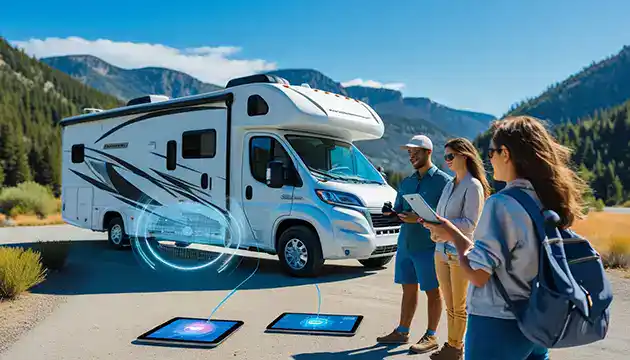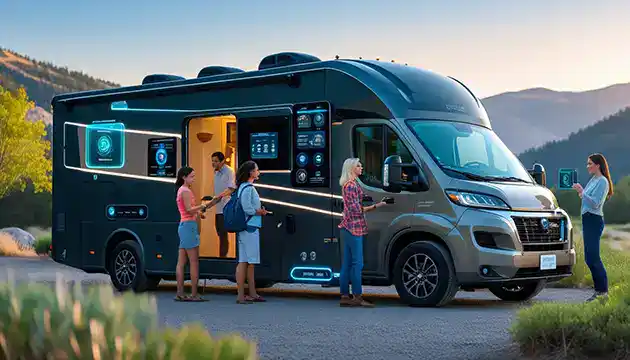
Thank you for reading our post, please rate this article at the end.
Reading Time: 12 minutesLast Updated on February 7, 2026 by Paul Clayton
Table of Contents
Leveraging AI for Smarter RV Travel
Key Takeaways
-
- AI Revolutionizes RV Travel: Artificial intelligence is significantly enhancing the RV experience by offering smart solutions for trip planning, vehicle control, and safety.
- Enhanced Planning & Personalization: AI algorithms create custom travel plans, suggest optimal routes based on RV specifications and real-time conditions (traffic, weather, restrictions), and recommend campgrounds tailored to individual preferences, saving research time.
- Increased Convenience & Comfort: Modern RVs integrate AI for voice-activated controls of internal systems (temperature, lighting, entertainment), automatic monitoring of vital resources (battery, water, propane), and smart climate control, leading to a more comfortable and efficient journey.
- Improved Safety & Security: AI contributes to safety through automated driving assistance systems (lane departure, blind spot detection), smart security cameras, emergency response features, and predictive maintenance to prevent issues like tire blowouts.
- Specialized AI Tools: Platforms like AdventureGenie offer all-in-one trip planning, personalized campground recommendations (GenieMatch), concise campsite summaries (GenieSummary), and site evaluations (GenieScore), complete with interest-based suggestions (GenieWishes).
- Optimized Energy Management: AI systems manage power usage efficiently, balancing battery charging, solar output, and generator use, and learning consumption patterns to extend boondocking time and improve fuel efficiency.
- Benefits vs. Challenges: While AI brings immense convenience, customization, fuel efficiency, and sustainability to RV travel, it also raises important considerations regarding data security and privacy.
RV travel is getting a major upgrade thanks to artificial intelligence. AI is now helping RV travelers plan better routes, find perfect campsites, and even control their vehicles with smart automation features. From chatbots that create detailed trip itineraries to sensors that enhance safety on the road, technology is making RV adventures more enjoyable and stress-free.
We’re seeing AI-powered services recommend campsites that match travelers’ specific needs and preferences. Smart RV systems can now monitor everything from tire pressure to energy usage while providing real-time updates about weather and road conditions.
The transformation goes beyond just planning tools. Modern RVs are getting equipped with AI features that handle routine tasks automatically, allowing travelers to focus on enjoying their journey. We’ll explore the specific tools, apps, and smart features that are changing how people experience life on the road, plus what challenges and opportunities lie ahead for AI-powered RV travel.
How Artificial Intelligence Is Transforming RV Travel

AI technology is changing how we plan, experience, and stay safe during RV adventures. These smart systems help us find better routes, control our RV features with voice commands, and keep us protected on the road.
AI-Powered Trip Planning and Personalization
AI algorithms analyze vast databases to create custom travel plans that match our specific needs. These systems consider our RV size, travel preferences, and budget to suggest the best routes and stops.
Modern AI platforms recommend campgrounds based on our past stays and reviews. They factor in amenities we prefer, like full hookups or pet-friendly policies.
Smart route planning considers real-time traffic, weather, and road conditions. The AI adjusts our path to avoid low bridges, steep grades, or weight restrictions that could cause problems for our RV.
AI-powered travel assistants learn from our travel patterns. They suggest new destinations similar to places we enjoyed before. This saves us hours of research time.
Some key features include:
- Personalized recommendations for attractions and restaurants
- Dynamic pricing alerts for campgrounds and fuel
- Weather-based itinerary adjustments
- Integration with RV specifications for safe routing
New vs. Used RV: Navigating the Price Trends
Can You Rent an RV for a Year?
Enhancing Convenience and Comfort in Modern RVs
Voice-controlled smart home features are becoming standard in new RVs. We can adjust temperature, lighting, and entertainment systems using simple voice commands.
AI systems monitor our RV’s vital systems automatically. They track battery levels, water tank capacity, and propane usage. We get alerts before we run out of essential resources.
Smart climate control learns our temperature preferences throughout the day. It adjusts heating and cooling to maintain comfort while saving energy.
AI-powered connectivity helps us find the best internet signals. These systems automatically switch between cellular networks to maintain our connection for work or entertainment.
Maintenance scheduling becomes easier with AI monitoring. The system tracks usage patterns and suggests service intervals based on our actual driving conditions rather than just mileage.
Safety and Security Innovations in RV Travel
Automated driving assistance systems help us navigate safely with our larger vehicles. Lane departure warnings and blind spot detection are specially calibrated for RV dimensions.
AI security systems protect our RV when we’re away exploring. Smart cameras recognize unusual activity and send alerts to our phones. Motion sensors can tell the difference between animals and potential threats.
Emergency response features automatically contact help if we’re in an accident. GPS tracking helps emergency services find us quickly, even in remote areas.
Weather monitoring AI provides hyper-local forecasts for our exact location. We get early warnings about severe weather that could affect our safety or travel plans.
Smart tire monitoring uses AI to predict tire problems before they happen. The system tracks pressure, temperature, and wear patterns to prevent dangerous blowouts on the highway.
Advanced AI Tools and Apps for RV Travelers

Modern AI-powered platforms are transforming the way we plan and experience RV trips with smart features like personalized campground matching and detailed site analysis. These tools save hours of research while delivering customized recommendations based on our specific travel preferences and RV requirements.
AdventureGenie: The All-in-One Trip Planning Solution
AdventureGenie stands out as a comprehensive AI-powered trip planner designed specifically for RV travelers. The platform combines route planning, campground selection, and activity recommendations in one streamlined interface.
We can create trips in three different ways. First, we build custom routes from scratch using the drag-and-drop trip planner. Second, we describe our travel vision to the Personal Genie assistant for automated itinerary creation.
Third, we start with pre-built GenieTrips focused on popular destinations or themes. Each approach lets us customize drive times, add activities, and adjust stops to match our travel style.
The platform handles RV-specific needs like safe routing and full-hookup sites. Integrated booking features let us reserve campgrounds directly through the system. We can export itineraries to GPS devices and share detailed plans with travel companions.
Personalized Recommendations with GenieMatch
GenieMatch uses AI algorithms to rank and recommend campgrounds based on our specific RV setup and preferences. The system considers factors like RV length, hookup needs, and travel style to deliver targeted suggestions.
We input details about our rig size, preferred amenities, and camping style during setup. GenieMatch then filters thousands of campgrounds to show only relevant options. Pet-friendly sites, pull-through spots, and full-hookup locations get priority based on our requirements.
The matching system learns from our choices over time. When we select certain campgrounds, it refines future recommendations to better align with our preferences. This creates increasingly accurate suggestions for each new trip we plan.
Summarizing Campsite Insights with GenieSummary
GenieSummary processes extensive campground data to provide quick, digestible overviews of each location. Instead of reading dozens of reviews, we get key information presented in clear, organized formats.
Each summary includes essential details like:
- Amenity highlights (WiFi, pools, hiking trails)
- Price ranges and seasonal variations
- Site types available (pull-through, back-in, tent)
- Nearby attractions and activities
The AI analyzes review patterns to identify common praise and complaints. We see recurring themes about noise levels, site spacing, or facility cleanliness without scrolling through individual reviews.
This saves significant research time while ensuring we understand each campground’s strengths and potential drawbacks before booking.
Evaluating Sites with GenieScore and GenieWishes
GenieScore provides AI-generated ratings from 1-100 that aggregate multiple data sources into a single quality indicator. The scoring system weighs factors like review sentiment, amenity quality, and location advantages to create comprehensive site evaluations.
We use these scores to quickly compare campgrounds in our target areas. Higher scores indicate better overall experiences based on traveler feedback and objective criteria. The system accounts for different camping styles, so luxury resort preferences don’t unfairly penalize basic campgrounds.
GenieWishes lets us specify interests like hiking, local cuisine, or historical sites. The AI then suggests relevant stops and activities along our route. We might discover craft breweries, scenic overlooks, or farmers’ markets we would have missed otherwise.
These wish-based recommendations integrate seamlessly with our planned route and campground stays.
Smart Features in AI-Integrated RVs

Modern AI-integrated RVs now include navigation systems that learn from our travel patterns, voice controls that respond to natural speech, maintenance systems that predict problems before they occur, and energy management that optimizes power usage automatically. These features work together to create a more comfortable and efficient travel experience.
Navigation and Route Optimization
AI navigation systems go far beyond basic GPS routing. They analyze real-time traffic data, weather conditions, and road restrictions specific to RV travel.
The systems learn from our driving habits and preferences. They remember which types of roads we prefer and which campgrounds we visit most often.
Route optimization considers:
- RV height, weight, and length restrictions
- Bridge clearances and weight limits
- Steep grades and narrow roads
- Real-time traffic and construction delays
We can set preferences for scenic routes versus fastest travel times. The AI adjusts recommendations based on fuel costs, tolls, and available camping spots.
Some systems include adaptive cruise control that maintains safe following distances. This feature reduces driver fatigue on long trips and improves fuel efficiency by maintaining steady speeds.
Voice-Activated Controls and Assistance
Voice-activated controls let us manage RV systems without taking our hands off the wheel or eyes off the road. We can adjust temperature, lighting, and entertainment systems using simple voice commands.
Smart RV systems respond to natural language rather than specific phrases. We can say “it’s too warm” instead of memorizing exact commands for the air conditioning.
Common voice functions include:
- Climate control adjustments
- Slide-out operation
- Awning deployment
- Interior and exterior lighting
- Entertainment system control
- System status checks
The AI learns our speech patterns and preferences over time. It can distinguish between different family members and apply personal settings automatically.
Some systems integrate with popular voice assistants. This allows us to check the weather, make reservations, and get local information while driving.
Predictive Maintenance and System Diagnostics
Predictive maintenance systems monitor RV components continuously. They track performance patterns and identify potential problems before breakdowns occur.
Sensors monitor engine performance, battery health, and fluid levels. The system alerts us when maintenance is needed and can schedule service appointments automatically.
Monitored systems typically include:
- Engine and transmission performance
- Brake system condition
- Tire pressure and wear
- Battery charge cycles and health
- Water system leaks and pump operation
We receive notifications through smartphone apps or dashboard displays. The system provides specific recommendations and estimated repair costs.
Some systems connect directly with service centers. They can transmit diagnostic data and order parts before our arrival.
This proactive approach reduces roadside breakdowns. It also helps us budget for maintenance and extend component life.
Improved Energy Management and Efficiency

Energy management systems optimize power usage across all RV systems. They balance battery charging, solar panel output, and generator operation automatically.
The AI learns our power consumption patterns throughout the day. It prioritizes essential systems and manages non-critical loads during low battery periods.
Energy optimization features:
- Automatic generator start/stop based on battery levels
- Solar panel angle adjustment for maximum output
- Load balancing between AC and DC systems
- Smart battery charging to extend battery life
We can set energy priorities through smartphone apps. The system will maintain refrigeration and safety systems while reducing power to entertainment devices when needed.
Fuel efficiency improvements come from optimized engine performance and route planning. Some systems adjust driving recommendations based on terrain and weather conditions.
The energy management technology can extend boondocking time significantly. We can camp off-grid longer without running generators constantly or worrying about battery depletion.
Benefits and Challenges of AI in RV Travel
AI technology brings significant advantages to RV travel through automated systems and smart features, while also raising important questions about data protection and system reliability. We’ll explore how artificial intelligence enhances convenience and fuel efficiency, alongside the privacy concerns that come with connected RV systems.
Convenience and Customization on the Road
AI transforms how we interact with our RVs through voice-activated controls and automated systems. AI-integrated RVs can adjust interior temperature, optimize routes, and handle multiple functions without manual input.
Key convenience features include:
- Voice commands for lighting, awnings, and climate control
- Automated campground reservation systems
- Real-time route adjustments based on traffic and weather
- Predictive maintenance alerts before problems occur
We can now plan trips using AI trip planners like AdventureGenie that map routes between departure and destination points. These tools consider RV-specific factors like bridge heights and weight restrictions.
The technology learns our travel patterns and preferences over time. This creates a personalized experience that adapts to our specific needs and camping styles.
Enhancing Fuel Efficiency and Sustainability
Artificial intelligence helps RVs operate more efficiently through smart energy management and route optimization. AI systems monitor fuel consumption patterns and suggest driving adjustments to improve mileage.
Fuel efficiency improvements:
- Route optimization based on terrain and traffic
- Adaptive cruise control that maintains optimal speeds
- Engine performance monitoring and recommendations
- Solar panel management for battery charging
Energy management becomes more precise with AI technology. The systems track power usage patterns and optimize battery life during off-grid camping. They can predict when we’ll need to recharge based on our planned activities.
AI-driven energy systems optimize solar charging and recommend the best times to conserve power. This extends our ability to camp without hookups while reducing our environmental impact.
Data Security and Privacy Considerations
Connected RVs collect personal information about our travel habits, locations, and preferences. Data privacy concerns grow as AI technology becomes more widespread in travel applications.
Privacy risks include:
- Location tracking and movement patterns
- Personal preference data collection
- Voice recording storage
- Financial information from booking systems
We must understand what data our RV systems collect and how companies use this information. Many AI features require internet connectivity, which creates potential security vulnerabilities.
The challenge lies in balancing convenience with privacy protection. We need to review privacy policies and adjust settings to limit data sharing when possible. Some AI features may work offline to reduce these concerns.
The Future of AI-Powered RV Adventures
The RV industry stands on the brink of a technological revolution that will reshape how we travel and live on the road. Advanced AI systems will become standard features in RVs while creating entirely new ways to experience mobile living.
Emerging Trends in AI for RVs

Integrated Smart RV Ecosystems are becoming the new standard. Modern AI-integrated RVs feature automated navigation systems that adapt to real-time weather and traffic conditions. These systems connect multiple RVs on the road to share travel tips and campground availability.
Voice-controlled assistants will manage our entire RV environment. We can expect to control lighting, temperature, and entertainment systems through simple voice commands.
Predictive Maintenance Technology will constantly monitor our RV’s health. AI sensors will detect potential problems before they happen. This means fewer breakdowns and costly repairs on the road.
Enhanced Safety Features continue to evolve rapidly. AI-powered lane departure warning systems now provide real-time alerts to prevent accidents. Advanced collision avoidance systems will become standard equipment.
Personalized Route Planning will reach new levels of sophistication. AI trip planners will learn our travel preferences and suggest destinations based on our interests. These systems will automatically adjust itineraries based on weather patterns and local events.
Long-Term Implications for RV Lifestyle
The RV lifestyle will become more accessible to new demographics. AI systems will handle complex trip planning that once required extensive experience. First-time RVers will feel confident tackling cross-country adventures with AI guidance.
Remote Work Integration will transform how we use our RVs. AI-powered connectivity solutions will ensure reliable internet anywhere we travel. Smart workspace management will optimize our RV office setup automatically.
Community Building will strengthen through AI matchmaking. Systems will connect RVers with similar interests and travel patterns. We will form traveling groups and share resources more easily.
Sustainable Travel Practices will become the norm. AI will optimize our routes for fuel efficiency and suggest eco-friendly camping options. Carbon footprint tracking will help us make better environmental choices.
The traditional boundaries between home and travel will continue to blur. Our AI-powered RVs will become true mobile homes that adapt to our needs seamlessly.
Frequently Asked Questions
RV travelers often have specific questions about how AI can improve their road trip experiences. These tools offer features like personalized route planning, campground recommendations, and real-time travel adjustments.
What are the top features to look for in an AI-powered RV trip planning tool?
We recommend looking for tools that offer RV-specific route planning with height and weight restrictions. The best AI apps for RV travel include real-time updates and personalized itineraries.
Key features include campground availability checking and fuel stop recommendations. Look for apps that integrate weather data and traffic conditions into their planning algorithms.
We also suggest finding tools that can learn from your preferences over time. This helps the AI make better suggestions for future trips based on your travel history.
How does artificial intelligence enhance the RV camping experience?
AI enhances the camping experience by offering personalized recommendations tailored to your specific needs and preferences. AI-powered RV travel creates tailored adventures with smarter route planning.
We see AI helping with campground selection by analyzing reviews, amenities, and availability. It can match sites to your RV size and preferred activities like hiking or fishing.
Real-time monitoring helps track weather conditions and suggests backup plans when needed. AI can also recommend nearby attractions and restaurants based on your location and interests.
What are the benefits of using a travel genie app for planning my RV adventure?
Travel genie apps save significant time by automating the research and booking process. We find these tools especially helpful for creating detailed itineraries without hours of manual planning.
They provide 24/7 assistance for travel questions and can adjust plans instantly when situations change. AI travel planning tools offer expert advice and time-saving features.
We appreciate how these apps learn your preferences and improve recommendations over time. They can suggest activities, restaurants, and attractions that match your specific interests.
Can AI recommend the best campgrounds and RV parks based on my preferences?

Yes, AI analyzes vast amounts of data to match campgrounds with your specific requirements. It considers factors like RV size limits, hookup types, and preferred amenities.
We see AI tools comparing thousands of reviews to identify parks that match your camping style. They factor in preferences like quiet locations, pet-friendly policies, or proximity to attractions.
The technology also considers seasonal availability and pricing to suggest the best value options. AI can even predict which campgrounds will have availability during peak travel times.
How does an AI road trip planner optimize travel routes for RVs?
AI planners consider RV-specific restrictions like bridge heights, weight limits, and narrow roads. RV trip planning with AI creates routes that avoid problematic areas for large vehicles.
We find these tools excel at calculating fuel stops based on your RV’s consumption and tank size. They identify stations with easy RV access and competitive pricing along your route.
The AI also factors in traffic patterns, construction zones, and weather conditions. It can suggest alternative routes when delays occur or conditions become unsafe for RV travel.
In what ways can AI assist with real-time decision-making during an RV journey?
AI provides instant updates about changing road conditions, weather alerts, and traffic delays. We rely on these tools to make quick decisions about route changes or extended stops.
AI chatbots for travel can instantly find alternative campgrounds when plans change unexpectedly. They help locate nearby services like repair shops or grocery stores.
Real-time AI assistance helps us evaluate safety conditions and suggests when to delay travel. It can also recommend activities or attractions when we have unexpected free time during our journey.
Home page
Back to the top of the page



